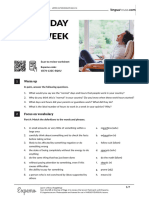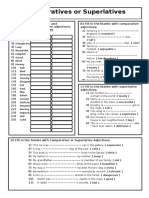Buying A Home British English Student
Buying A Home British English Student
Uploaded by
Loungo RalekgoboCopyright:
Available Formats
Buying A Home British English Student
Buying A Home British English Student
Uploaded by
Loungo RalekgoboOriginal Title
Copyright
Available Formats
Share this document
Did you find this document useful?
Is this content inappropriate?
Copyright:
Available Formats
Buying A Home British English Student
Buying A Home British English Student
Uploaded by
Loungo RalekgoboCopyright:
Available Formats
HEAAADERLOGORIGHT
GENERAL ENGLISH · VOCABULARY DEVELOPMENT · UPPER-INTERMEDIATE (B2-C1)
BUYING
A HOME
QrrkoD Scan to review worksheet
Expemo code:
1CB2-A5BE-GEPS
1 Warm-up
Do many people buy homes in your country?
2 People and businesses
Match the name of the person or business to the definition.
1. a solicitor
2. a surveyor
3. a mortgage broker
4. an estate agent
5. a mortgage lender
a. a business that will lend you money to buy a home
b. a company that helps you decide how much you can borrow and communicates with the company
that lends you this money
c. a person or business that organizes selling or renting homes
d. a person who examines a building to make sure that there are no problems
e. a person who has the responsibility for handling legal tasks during the buying process
Talk to a partner about what you know about buying a house.
FOOOOTERRIGHT Learn without forgetting! 1/3
Scan the QR at the top of Page 1 to review the lesson flashcards with Expemo.
© Linguahouse.com. Photocopiable and licensed for use in Loungo Ralekgobo's lessons.
HEAAADERLOGORIGHT
UPPER-INTERMEDIATE (B2-C1)
BUYING A HOME
3 Buying a home
Match the headings to the correct paragraphs.
Arrange a survey Make an offer Organise someone to handle the paperwork Complete
the sale Do your homework Exchange contracts Find a mortgage
BUYING A HOME
Here are the basic steps of buying a home.
1.
Unless you have a lot of savings, you will need to get a mortgage. A mortgage is a loan to
buy a house. Buyers need to calculate their monthly outgoings and make sure that they
can still pay the mortgage if interest rates rise or their circumstances change.
2.
Searching online first is a good option. You can also find an independent broker who can
help with the process. A bank might be able to do a special deal if you are an existing
customer.
3.
If the seller agrees to your proposition, then the buying process can go ahead. You won’t
have to complete the deal if there’s a problem with the survey or contract.
4.
You will need to hire a solicitor or conveyancer to handle all the legal procedures. They
will check that there are no planning restrictions or local issues that might affect the value
of the property.
5. This will show any potential problems with the property.The
property should also be valued to check that it’s worth the asking price. If there are any
problems, the surveyor can usually tell you how much they would cost to fix. If this is
the case, you might decide to renegotiate the price with the seller or pull out of the deal
altogether.
6.
Once this is done, the seller should take meter readings. If everyone is happy, now is the
time to sign the contracts. At this stage you will have to pay a deposit, normally 10% of
the price. When this happens, the buyer and seller have committed to the sale. If you pull
out of the deal, you will probably lose your deposit.
7.
This is when the property becomes yours. You get the keys and the deeds ... but there will
be some bills to pay! These are the rest of the cost of the property (usually 90%), solicitor’s
fees, the government tax of stamp duty and removal costs.
Congratulations, you now own your first home!
FOOOOTERLEFT Learn without forgetting! 2/3
Scan the QR at the top of Page 1 to review the lesson flashcards with Expemo.
© Linguahouse.com. Photocopiable and licensed for use in Loungo Ralekgobo's lessons.
HEAAADERLOGORIGHT
UPPER-INTERMEDIATE (B2-C1)
BUYING A HOME
4 Find the words
Find the words or phrases in bold in the text which mean....
1. an amount of money you pay when you agree to buy something (noun):
2. amounts of money that you spend regularly, usually on bills (plural noun):
3. the amount of money that a seller would like to get for their home (noun phrase):
4. discuss again how much you will pay for something (collocation):
5. promised that you would buy something (phrase):
6. problems happening in an area close to a property (collocation):
7. decide not to complete the agreement (phrase):
8. legal documents regarding the ownership of property (plural noun):
5 Talking Point
With a partner, ask and answer any of the questions below.
Renting
1. What is important to you when looking for a place to rent?
2. Have you ever had any really bad flatmates?
3. Have you ever rented a terrible flat or house? What was wrong with the place?
Buying
1. In your country, is the home buying process different to that in Exercise 3?
2. What do you need to pay careful attention to when buying a home?
3. Would you prefer to buy or rent a home? What are some of the advantages and disadvantages?
6 Further Practice/Homework
Write an advertisement to sell a house or flat/apartment.
FOOOOTERRIGHT Learn without forgetting! 3/3
Scan the QR at the top of Page 1 to review the lesson flashcards with Expemo.
© Linguahouse.com. Photocopiable and licensed for use in Loungo Ralekgobo's lessons.
You might also like
- A Dream Trip American English TeacherDocument14 pagesA Dream Trip American English TeacherCatel MarinaNo ratings yet
- Making ExcusesDocument2 pagesMaking ExcusesBahri Kaan ÇetinNo ratings yet
- Sales Digests 2020Document60 pagesSales Digests 2020Zsa-shimi FranciscoNo ratings yet
- Clothes and Weather Game (English)Document15 pagesClothes and Weather Game (English)Rocio SanromanNo ratings yet
- IELTS General Training Writing Practice Test - General Training Writing Task 2Document1 pageIELTS General Training Writing Practice Test - General Training Writing Task 2rajjjpapuNo ratings yet
- 2.possessive Adjectives + KEYDocument3 pages2.possessive Adjectives + KEYJorgeEFVNo ratings yet
- Travel British English TeacherDocument4 pagesTravel British English TeacherAndreea MihalacheNo ratings yet
- ESL Brains What Im Trying To Say Is . Clarifying and Explaining SV 7143Document4 pagesESL Brains What Im Trying To Say Is . Clarifying and Explaining SV 7143Valeria TapiaNo ratings yet
- Bad DebtDocument5 pagesBad DebtlamorlaNo ratings yet
- Spring Is Coming British English TeacherDocument15 pagesSpring Is Coming British English TeacherKarolina KudelskaNo ratings yet
- Cross Cultural Communication British English StudentDocument6 pagesCross Cultural Communication British English StudentFU:TURENo ratings yet
- CelebritiesDocument4 pagesCelebritiesrmaiconigcombrNo ratings yet
- Statistics and Trends: Representing DataDocument3 pagesStatistics and Trends: Representing DataJorge Horacio Perez EspinalesNo ratings yet
- Pronoun ChartDocument1 pagePronoun ChartparthibankbtNo ratings yet
- The Weather and ClothesDocument19 pagesThe Weather and ClothesOzle IsimanNo ratings yet
- The Best and Worst Holidays British English TeacherDocument10 pagesThe Best and Worst Holidays British English TeacherJulia SzwejNo ratings yet
- Going On A Business Trip British English Intermediate GroupDocument3 pagesGoing On A Business Trip British English Intermediate GroupMaryNo ratings yet
- Prepositions of MovementDocument4 pagesPrepositions of MovementLucia MeloNo ratings yet
- Task4:: Put The Following Expressions in The Right ColumnDocument1 pageTask4:: Put The Following Expressions in The Right ColumnAlex OpreanNo ratings yet
- Exe 2 Pet PracticeDocument6 pagesExe 2 Pet PracticeVianka García López100% (1)
- First and Second Conditional PDFDocument1 pageFirst and Second Conditional PDFAsvNo ratings yet
- It Must Be Halloween: 1. DiscussDocument5 pagesIt Must Be Halloween: 1. DiscussjayweinxNo ratings yet
- Banking British English Teacher Ver2 BWDocument7 pagesBanking British English Teacher Ver2 BWDina JurķeNo ratings yet
- Buying A HomeDocument6 pagesBuying A HomeSteve EvansNo ratings yet
- Subject Pronouns 1 PDFDocument1 pageSubject Pronouns 1 PDFReynabeth MacaraigNo ratings yet
- Fichas de Francês AQUADocument16 pagesFichas de Francês AQUAManuela RuasNo ratings yet
- Easter Words and TraditionsDocument3 pagesEaster Words and TraditionsGeorgi StamatovNo ratings yet
- Module 1. Family and RelationshipsDocument6 pagesModule 1. Family and RelationshipsokecaloNo ratings yet
- 3 Ingles I PDFDocument121 pages3 Ingles I PDFEVER RIVERANo ratings yet
- A Four Day Workweek American English StudentDocument7 pagesA Four Day Workweek American English StudentMargo FidurskaNo ratings yet
- Making A Phone Call British English TeacherDocument8 pagesMaking A Phone Call British English TeacherAnahíNo ratings yet
- Your English Pal ESL Lesson Plan Happiness v3Document5 pagesYour English Pal ESL Lesson Plan Happiness v3Виктория КушнаренкоNo ratings yet
- First Meeting British English StudentDocument6 pagesFirst Meeting British English StudentFrancesca VellaNo ratings yet
- Asking For DirectionsDocument5 pagesAsking For DirectionsSara AlizieriNo ratings yet
- Pitching An Idea British English Intermediate GroupDocument5 pagesPitching An Idea British English Intermediate GroupJames LopezNo ratings yet
- The Career LadderDocument6 pagesThe Career LaddergfzgsmqbtxNo ratings yet
- Comparatives e SurpelativsDocument1 pageComparatives e SurpelativsVera RochaNo ratings yet
- Job CollocationsDocument2 pagesJob Collocationszanda.sNo ratings yet
- International Womens Day British English Teacher PDFDocument13 pagesInternational Womens Day British English Teacher PDFMario AshrafNo ratings yet
- Friends - Lesson Notes IELTSDocument7 pagesFriends - Lesson Notes IELTSNguyen Gios SangNo ratings yet
- Lessons For IELTS Advanced SpeakingDocument155 pagesLessons For IELTS Advanced SpeakingQuang VũNo ratings yet
- Hello Im On The Plane British English TeacherDocument10 pagesHello Im On The Plane British English Teacherwlimaoteacher5No ratings yet
- Tense Review 2 British English Teacher Ver2 BWDocument5 pagesTense Review 2 British English Teacher Ver2 BWDaniroquai LapunkiNo ratings yet
- Knock On Wood British English StudentDocument8 pagesKnock On Wood British English StudentNataša PetrovićNo ratings yet
- Ket Speaking - Part I - Sample QuestionsDocument2 pagesKet Speaking - Part I - Sample Questionswolfis3No ratings yet
- French 3Document15 pagesFrench 3luciaNo ratings yet
- Towns and Cities (IELTS Speaking Part 1-3) PDFDocument4 pagesTowns and Cities (IELTS Speaking Part 1-3) PDFSofiane Feciane DehakNo ratings yet
- Furniture and AppliancesDocument4 pagesFurniture and AppliancesVicky Diez ReyNo ratings yet
- Elementary English Review 2 Units 10 17 British English StudentDocument9 pagesElementary English Review 2 Units 10 17 British English StudentАняNo ratings yet
- Grammar and Vocabulary Exercises StudentDocument226 pagesGrammar and Vocabulary Exercises StudentShiv SongaraNo ratings yet
- UNIT 6.1 Money-VocabularyDocument3 pagesUNIT 6.1 Money-Vocabularylintang cahyaniNo ratings yet
- Cultural DifferencesDocument3 pagesCultural DifferencesEmese Ebert TóthNo ratings yet
- Moody Mick's Day: Look at The Pictures. Ask and Answer QuestionsDocument6 pagesMoody Mick's Day: Look at The Pictures. Ask and Answer QuestionsVarga Kriszta0% (1)
- Role Play in ClassDocument12 pagesRole Play in ClassSerendipity EnglishNo ratings yet
- MODULE 12 Purchasing and Financing A HomeDocument7 pagesMODULE 12 Purchasing and Financing A HomeDonna Mae FernandezNo ratings yet
- Negotiations British English TeacherDocument12 pagesNegotiations British English TeacherJullyeneNo ratings yet
- Negotiations British English TeacherDocument12 pagesNegotiations British English TeachertutormarieeveNo ratings yet
- Negotiations British English TeacherDocument12 pagesNegotiations British English TeacherMelina RomaniNo ratings yet
- First Time Buyers GuideDocument38 pagesFirst Time Buyers GuideJamal AbunahelNo ratings yet
- Guide To Purchase Your HomeDocument28 pagesGuide To Purchase Your HomeDavid WangNo ratings yet
- Reconnect 2014 Web FinalDocument8 pagesReconnect 2014 Web Finalapi-251960333No ratings yet
- Teasdale V SandersonDocument1 pageTeasdale V SandersonAarav RamcharitarNo ratings yet
- Property Fall Semester CANSDocument29 pagesProperty Fall Semester CANSJjjjmmmmNo ratings yet
- 65 GB Minutes - FinalDocument14 pages65 GB Minutes - FinalNaveen KumarNo ratings yet
- Guthi Act - 0Document33 pagesGuthi Act - 0Sagun KatuwalNo ratings yet
- ARCH+ - Designing The Brief - Vassal in Conversation With Oswalt - 2019Document6 pagesARCH+ - Designing The Brief - Vassal in Conversation With Oswalt - 2019Yasna BerlinNo ratings yet
- Five Storey Four Star Hotel ResearchDocument4 pagesFive Storey Four Star Hotel ResearchKevin RamosNo ratings yet
- Marcelo-Soriano-vs.-Spouses-Galit-Sept.-23-2003-CASE-DIGESTDocument3 pagesMarcelo-Soriano-vs.-Spouses-Galit-Sept.-23-2003-CASE-DIGESTFe FernandezNo ratings yet
- Firm F5 Land Transactionsorkshop 2Document26 pagesFirm F5 Land Transactionsorkshop 2nimusiimamirianNo ratings yet
- Income From House PropertyDocument32 pagesIncome From House PropertyhanumanthaiahgowdaNo ratings yet
- Deyvanshu Transfer Property 15-11-18 PDFDocument10 pagesDeyvanshu Transfer Property 15-11-18 PDFDevanand PandeyNo ratings yet
- N0172830X PP&PDocument7 pagesN0172830X PP&PClive MuchenjeNo ratings yet
- Quiz 1 Midterm: Either I or IiiDocument5 pagesQuiz 1 Midterm: Either I or Iiibangtani kimNo ratings yet
- LEASE1Document3 pagesLEASE1Ana Leah DelfinNo ratings yet
- Doctrine of SubrogationDocument3 pagesDoctrine of SubrogationchitraNo ratings yet
- Tupaz v. CA, 475 SCRA 398 24. American Home Insurance v. FF. Cruz & Co., G.R. No. 174926Document36 pagesTupaz v. CA, 475 SCRA 398 24. American Home Insurance v. FF. Cruz & Co., G.R. No. 174926yodachanNo ratings yet
- Easement of Light and ViewDocument13 pagesEasement of Light and Viewkook0% (1)
- 20220907 WetlandSeasonsBay3 售樓說明書part1Document51 pages20220907 WetlandSeasonsBay3 售樓說明書part16fnjn8ckgyNo ratings yet
- Preference of CreditsDocument12 pagesPreference of CreditsMay Lann LamisNo ratings yet
- Registration of Interest FormDocument2 pagesRegistration of Interest FormVitlesh PanditaNo ratings yet
- 18 BARCENAS, Et Al. Vs Sps. TOMAS, G.R. No. 150321, March 31, 2005Document1 page18 BARCENAS, Et Al. Vs Sps. TOMAS, G.R. No. 150321, March 31, 2005Sidrick GalecioNo ratings yet
- LaGrange Rest CovDocument19 pagesLaGrange Rest CovjonathanrobertsNo ratings yet
- Chhattisgarh Rent Control ActDocument7 pagesChhattisgarh Rent Control ActAntriksh yadavNo ratings yet
- Code of Ethics and Standards of Practice, National Association of RealtorsDocument8 pagesCode of Ethics and Standards of Practice, National Association of RealtorsLarryDCurtisNo ratings yet
- Capital Gains TaxDocument3 pagesCapital Gains TaxAii Lyssa UNo ratings yet
- 2004 09 08 - Sumawang vs. de Guzman, GR No. 150106Document4 pages2004 09 08 - Sumawang vs. de Guzman, GR No. 150106Lourd CellNo ratings yet
- Market Rental Screening Criteria 3x TEXASDocument6 pagesMarket Rental Screening Criteria 3x TEXASrnj1230No ratings yet
- KILL - ARPP3 Ass100 - RevisedDocument24 pagesKILL - ARPP3 Ass100 - RevisedRoan Alexis LimboNo ratings yet
- University of Edinburgh - Past Paper - Property LawDocument7 pagesUniversity of Edinburgh - Past Paper - Property LawemilyNo ratings yet
- Lia 4002 - Legal Drafting 1 SEM 1 2020/2021 Individual AssignmentDocument2 pagesLia 4002 - Legal Drafting 1 SEM 1 2020/2021 Individual AssignmentJenn LeeNo ratings yet

























































































